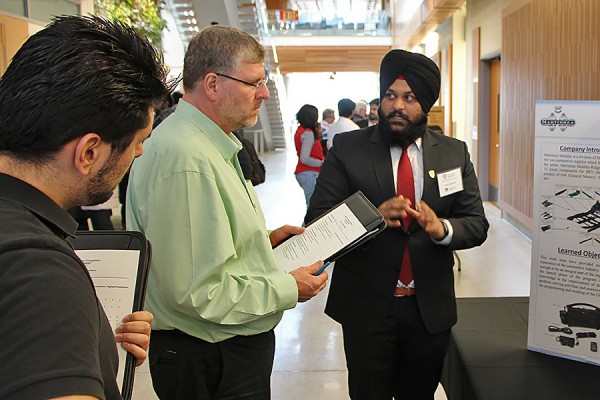 Doctoral student Frank Angione and professor Colin Novak listen to a presentation by Simar Singh Bajaj.
Doctoral student Frank Angione and professor Colin Novak listen to a presentation by Simar Singh Bajaj.
Learning a non-destructive way to test spot welds did more than save his employer thousands of dollars, says Simar Singh Bajaj — it helped to secure him a job.
The Master of Engineering - Automotive student was one of 11 discussing their co-operative education placements during poster presentations Friday in the Centre for Engineering Innovation.
Bajaj was working for Martinrea Metallic, a Ridgetown-based supplier of components for the GM Bolt. He said the manufacturer had to scrap parts every day because of imperfect welds. Using a portable ultrasonic tool made by Tessonics Inc. to analyze the parts, he saved the company an average of $1,200 each day. When his term ended, Martinrea offered to keep him on part-time while he completes his studies.
“It was a perfect experience for me,” says Bajaj. “I have learned a lot.”
That hands-on learning was key, says Mohammed Faizal Lavarawther Abdulla, who served a work term with Schukra, which makes lumbar systems for vehicle seats.
“They didn’t treat me as a student,” he says. “You have your own responsibility. To learn about the entire operation, they even put me a couple of days on the line.”
He created a prototype of a report application that graphs raw data, making analysis easier for managers.
“That’s the most important thing that I contributed to the company,” says Abdulla. “Saving a manufacturing engineer an hour or two every day is a big deal.”
And for Hetali Patel, who helped design procedures to eliminate errors in conveyor systems for the Prolann Group, the most important part of the experience was acclimatizing to a Canadian workplace.
“Co-op gives me practical knowledge,” says the native of Gujarat, India. “I am confident that when I graduate from the University of Windsor, I will be able to work in Canada.”
